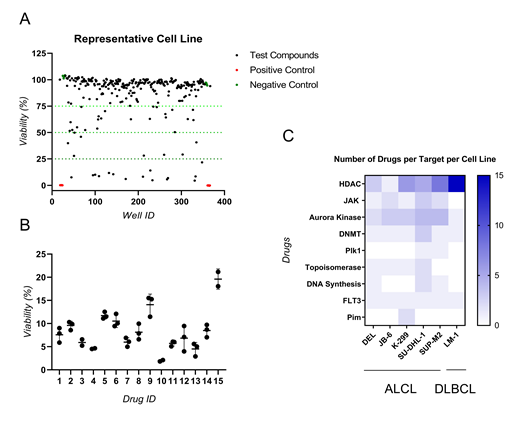Introduction
Through conserved signalling pathways, Anaplastic Lymphoma Kinase (ALK) is well-described in driving haematological malignancies including Anaplastic Large Cell Lymphoma (ALCL) and Diffuse Large B-Cell Lymphoma (DLBCL) and as such presents itself as an amenable therapeutic target. Hence, directed therapeutics (ALK tyrosine kinase inhibitors; TKI) are being used in the treatment of ALK-driven cancers. Unfortunately, findings in the clinic and clinical research studies have taught us that resistance to ALK inhibitors can develop through the activation of ALK signalling bypass tracks. As such there is a need for the development of novel front-line, dual-combination, as well as second-line therapies.
Methods
A large-scale epigenetic targeted drug library consisting of approximately 300 FDA-approved drugs and novel agents was applied to a number of cell lines representing ALK-driven haematological malignancies: ALCL cell lines (DEL, JB-6, KARPAS-299, SU-DHL-1, SUP-M2) and the DLBCL cell line LM-1. Drugs which caused a >75% decrease in cell viability were classified as 'candidate drugs' and studied further.
Results
Several of the validated drugs have previously been used/trialled in the clinic for the treatment of various cancers, e.g. aurora kinase (XL-228), topoisomerase (Mitoxantrone HCl) and HDAC (Romidepsin) inhibitors - these functioned as internal controls for the drug screens. However, an assortment of novel drugs was also identified that have not previously been described in the context of the treatment of ALK-driven haematological malignancies; including the FLT3 inhibitor KW2449 which caused a >75% decrease in viability in all the tested cell lines and as such may serve as a novel front line therapy. In addition, a novel DNA methyltransferase (DNMT) inhibitor was identified which is efficacious and resulted in a >90% decrease in viability in all cell lines treated across both disease entities. Furthermore, we investigated the combinatorial potential of the identified DNMT inhibitor with ALK TKIs such as Brigatinib and observed the inhibitor acting synergistically (as per Bliss-Independence calculations) resulting in a further decrease in cell viability. Several cell lines that are resistant to ALK TKIs were also assessed for their sensitivity to the DNMT inhibitor and were shown to be susceptible to this drug, as demonstrated by a significant decrease in cell viability.
Figure 1: (A) Viability following drug screen in a representative cell line. Those drugs which led to a >75% change in viability were taken forward for validation, as shown in (B). (C) Candidate drugs identified for each of the cell lines tested, grouped according to their molecular target.
Conclusion
In conclusion, an epigenetic drug library has been employed to identify novel therapeutic agents for the treatment of ALK-driven haematological malignancies including ALCL and DLBCL. Data reveal a potent inhibitor of DNA methylation as a candidate drug that suppresses the growth of ALK-driven malignancies both alone and in combination with ALK TKIs. Significantly, this identified drug also inhibits the growth of cell lines resistant to directed therapeutics such as ALK TKIs suggesting it has potential clinical use.
No relevant conflicts of interest to declare.
Author notes
Asterisk with author names denotes non-ASH members.


This feature is available to Subscribers Only
Sign In or Create an Account Close Modal